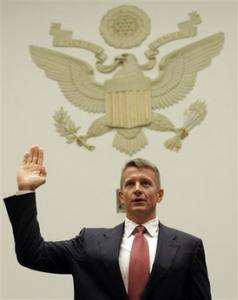 |
 |
 |
 Travel Writers' Resources | October 2007 Travel Writers' Resources | October 2007  
Whitewashing the Work of Killers
 Richard Lardner - Associated Press Richard Lardner - Associated Press
go to original


| | Blackwater USA's CEO Erik Prince: The head of Murder, Inc. (AP) |
Public relations giant Burson-Marsteller has vast experience steering companies through tough times. But there's a limit to how much it can help Blackwater USA, a new client that's been battered by negative publicity.

The State Department, which pays Blackwater hundreds of millions of dollars to protect U.S. diplomats in Iraq, has stringent rules barring the private security contractor from discussing with the media the details of its work, according to those familiar with the arrangement.

Under those limitations, it's difficult to repair a corporate image, said one official close to Blackwater.

The department allows little room for error. On Sept. 16, Blackwater guards were involved in a shoot-out in Baghdad that left 13 Iraqis dead. Blackwater issued a statement to reporters saying its personnel acted lawfully and appropriately to a "hostile attack" from "armed enemies."

That statement was not cleared first with State officials, a move that prompted complaints from the department because the statement pre-empted official inquiries into the incident. The Iraqis have maintained the Blackwater guards opened fire without provocation.

More recently, Erik Prince, Blackwater's top executive, appeared with department approval before a congressional committee investigating the company. Although Democrats on the committee were sharply critical of Prince, Blackwater representatives viewed his appearance as a rare and welcome opportunity to respond to their critics.

Even in a hostile hearing room, Prince could at least respond, said the official, who spoke on condition of anonymity because he wasn't authorized to speak to reporters.

Burson-Marsteller was brought aboard by the Washington law firms representing Blackwater — McDermott Will & Emery and Crowell & Moring.

One of the Burson-Marsteller executives working on the Blackwater account is Robert Tappan, a former State Department official who joined Burson-Marsteller in July and is president of the company's Washington office.

At State, Tappan was deputy assistant secretary for public affairs. While at State, he spent six months in Baghdad as director of strategic communications for the Coalition Provisional Authority, the temporary governing body that disbanded in June 2004.

Paul Cordasco, a spokesman for Burson-Marsteller, said the company does not discuss its clients.

According to the Center for Media and Democracy, Burson-Marsteller clients have included cigarette maker Philip Morris, nuclear power plant owner Entergy and Allergan, the pharmaceutical company that makes Botox.

Blackwater did not return a telephone call and an e-mail seeking comment.

The State Department is one of Blackwater's largest federal customers. Blackwater and two other private security companies protect U.S. diplomats and facilities in Iraq.

Richard Griffin, head of the State Department's Bureau of Diplomatic Security, said Tuesday that Blackwater earns about $473 million annually through the umbrella contract.

Formed in 1997 by Prince, a former Navy SEAL, Blackwater's business has grown since 2001 as the government's demand for its security services has increased.

According to the House Oversight and Government Reform Committee, Blackwater has received federal contracts worth more than a $1 billion, with the bulk of its earnings coming from the State Department.

On Tuesday, Prince, 38, spent several hours at the witness table as Democrats on the oversight committee accused his company of being above the law and his guards of being indifferent to Iraqi casualties.

The fees Blackwater charges are excessive, they said, and Prince and his associates have become wealthy because of the war.

Prince, younger than most members of the committee, calmly fielded the committee's questions, saying Blackwater personnel have acted appropriately in a chaotic environment. He received strong support from several Republicans, who said the criticism is motivated mainly by Prince's connections to Republican causes.

Len Biegel, a crisis management consultant who advised Johnson & Johnson 25 years ago during the Tylenol product-tampering case, said the Blackwater situation has escalated beyond a public relations emergency.

"It's really threatening the reputation of the company," Biegel said. "That puts it into the crisis category."

If Blackwater is to survive the crisis, Biegel said, it needs to show that it's making the changes necessary to prevent a repeat of situations that have cast it in such a negative light.

"It's not simply what is said by Blackwater, but what actions beyond the initial steps are they taking," Biegel said.

At the hearing, Prince said he supported legislation authored by Rep. David Price, D-N.C., that would ensure the U.S. government has the legal authority to prosecute crimes committed by contractors working in war zones.

On Thursday, the House overwhelming approved Price's bill.

Beau Phillips, a partner with the public relations firm Chlopak, Leonard, Schechter and Associates, said Blackwater needs to continue stressing that most of its employees are former military personnel.

"They need to help people understand that as you attack Blackwater, you're really attacking soldiers in a sense," Phillips said. "I think that's a message that would be helpful."

That may be a hard sell, however, given the unpopularity of the war in Iraq.

What was acceptable for defense contractors three years ago "will raise investigators' blood pressure today," said Richard Levick, a crisis communications expert and president of Levick Strategic Communications.

"Figuratively wrapping your company in the American flag works when the war is supported by the majority," Levick wrote in a blog posted last month on his company's Web site. "But when the tide turns, old messages no longer have the same effect."

Associated Press writer Matthew Lee contributed to this report. | 
 | |
 |



